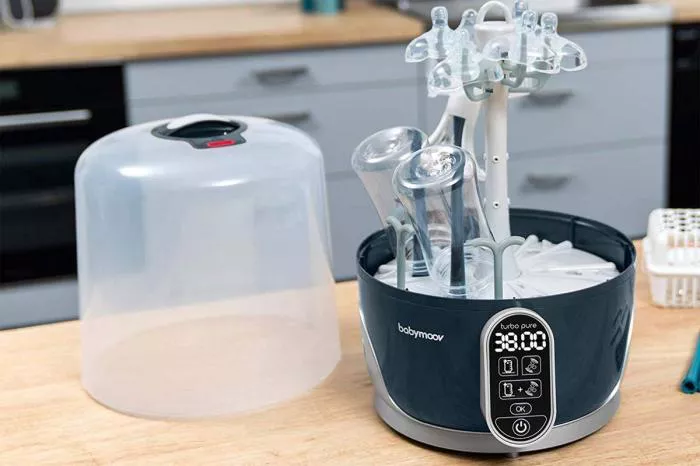When it comes to caring for a newborn, parents often face numerous decisions. One common question is whether a bottle sterilizer is truly necessary. This article explores the need for sterilizing baby bottles, the benefits of using a sterilizer, alternative methods, and the best practices for ensuring your baby’s feeding equipment is safe and clean.
Understanding the Need for Sterilization
Babies have delicate immune systems. Newborns are particularly vulnerable to infections. They can easily get sick from germs found in unwashed or improperly cleaned bottles. For this reason, many parents consider sterilizing baby bottles essential.
Sterilization is the process of killing germs, bacteria, and viruses on surfaces. It goes beyond washing bottles with soap and water. While washing can remove visible dirt, sterilizing ensures that any remaining harmful microorganisms are destroyed.
The Benefits of Using a Bottle Sterilizer
A bottle sterilizer offers several advantages:
Convenience: Sterilizers are designed to make the process easy. You can sterilize multiple bottles at once, saving time.
Effectiveness: Many sterilizers use steam or UV light, which can kill a wider range of bacteria compared to hand washing.
Less Stress: For new parents, the first few months can be overwhelming. Knowing that your baby’s feeding equipment is thoroughly sterilized can provide peace of mind.
Consistency: Using a sterilizer ensures that all bottles are cleaned in the same way. This can be particularly important for parents who want to maintain strict hygiene standards.
Time-Saving: Many electric sterilizers work quickly. You can have sterilized bottles ready in about 10 to 15 minutes.
Types of Bottle Sterilizers
There are several types of sterilizers on the market. Understanding the different options can help you choose the best one for your needs.
Electric Steam Sterilizers: These devices use steam to sterilize bottles. They are efficient and can handle multiple bottles at once.
Microwave Sterilizers: These require a microwave. You fill the sterilizer with water, place the bottles inside, and heat them in the microwave. This method is quick and convenient.
Cold Water Sterilizers: This method uses cold water and sterilizing tablets. You soak the bottles in the solution for a specific time. While it is less common, it can be a useful option for parents who travel or do not have access to electricity.
UV Sterilizers: These devices use ultraviolet light to kill germs. They can be effective but may be more expensive than other options.
Alternatives to Bottle Sterilizers
While bottle sterilizers are helpful, they are not the only way to keep bottles clean. Here are some alternatives:
Hand Washing: You can wash bottles thoroughly with hot, soapy water. Use a bottle brush to clean the insides well. Rinse them under hot water to remove soap residue.
Dishwasher: Many parents use dishwashers to clean baby bottles. Ensure they are dishwasher-safe. Place them on the top rack and use a hot cycle.
Boiling: You can boil bottles and nipples in water for five to ten minutes. This method is effective but requires careful attention to avoid burns.
Cleaning Solutions: Some parents use commercial cleaning solutions designed for baby bottles. Be sure to follow the instructions carefully.
When Is Sterilization Necessary?
Sterilization is essential in certain situations:
Newborns: For babies under three months, sterilization is crucial. Their immune systems are still developing, making them more susceptible to infections.
Illness: If your baby has been sick, it is wise to sterilize bottles to prevent reinfection.
Premature Babies: Babies born prematurely may require extra precautions. Consult your pediatrician about sterilization practices.
Traveling: When traveling, using a sterilizer can ensure that bottles remain clean, especially in unfamiliar environments.
When You Can Skip Sterilization
As your baby grows, the need for sterilization may decrease. Most pediatricians agree that:
After Three Months: Once your baby is three months old, you may not need to sterilize bottles as frequently. Their immune systems are stronger.
Healthy Environment: If your home is clean and you regularly wash bottles, sterilization may not be as necessary.
Healthy Baby: If your baby is healthy and gaining weight, you might not need to worry as much about sterilization.
Best Practices for Bottle Care
Regardless of whether you use a sterilizer, following best practices for bottle care is important.
Clean Immediately: Wash bottles immediately after use. This prevents milk from drying and makes cleaning easier.
Inspect Bottles: Regularly check for any cracks or signs of wear. Damaged bottles should be replaced.
Avoid Shared Equipment: Do not share bottles with other babies. This reduces the risk of spreading germs.
Store Properly: Ensure that clean bottles are stored in a clean, dry place. Cover them to keep them free from dust.
Use Hot Water: Always use hot water when washing bottles. It helps to kill germs and makes soap more effective.
Avoid Soft Sponges: Use a bottle brush instead of a soft sponge to clean the inside of bottles effectively.
Dry Thoroughly: Make sure bottles are completely dry before storing them. Moisture can promote bacterial growth.
See also: How To Wash A Milk Bottle
Conclusion
Whether you need a bottle sterilizer depends on your circumstances. For new parents and especially for those with newborns, a sterilizer can provide peace of mind and effective cleaning. However, as your baby grows and their immune system develops, you may find that regular washing is sufficient.
Ultimately, the goal is to keep your baby safe and healthy. By following proper cleaning practices and understanding the benefits and alternatives to sterilizers, you can ensure that your baby’s bottles are clean and ready for use.
If you have any doubts or specific concerns about sterilization, it is always best to consult your pediatrician. They can provide guidance tailored to your baby’s needs and health.
Related topics:


